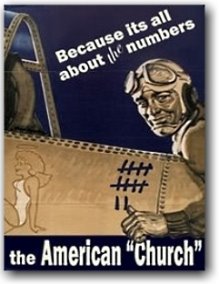One of the most amazing scenes in the New Testament occurs when Jesus, who had gathered many followers, lost all of them but twelve. Scores of people followed Christ, but they followed Him for what they could get out of it. Christ fed four thousand, and then He fed five thousand. He healed and restored the lame and diseased to perfect health. It is no wonder many followed to see what He would do next or find out what He would give them. But when the teaching got tough, they vanished.
In John 6, they ask Him, “What sign will you perform then, that we may see it and believe You? What work will You do? Our fathers ate the manna in the desert; as it is written, ‘He gave them bread from heaven to eat.’” In other words, they sought after the providence of God, and not God Himself. He had previously rebuked them by saying, “You seek Me, not because you saw the signs, but because you ate of the loaves and were filled.” They wanted Christ to prove Himself by performing as God performed toward their ancestors in the desert. Jesus replies, “Most assuredly, I say to you, Moses did not give you the bread from heaven, but My Father gives you the true bread from heaven. For the bread of God is He who comes down from heaven and gives life to the world.” Then they said to Him, “Lord give us this bread always.” But Christ knew they still did not understand. They did not know that he was speaking metaphorically. He said, “I AM the bread of life. He who comes to Me shall never hunger, and he who believes in Me shall never thirst.” Then, he laid it out for them. “But I said to you that you have seen Me and yet do not believe." Jesus was the bread of life! They could not see. He went on to say, “He who eats My flesh and drinks My blood abides in Me, and I in him. . . This is the bread which came down from heaven – not as your fathers ate the manna, and are dead. He who eats this bread will live forever.” Jesus popped their proverbial bubble. And John says, “From that time many of His disciples went back and walked with Him no more.”
I can almost picture the scene in my mind. The conversation between Jesus and crowd was over. Stunned and dismayed, the crowd stared at Him in disbelief. Murmuring began, they slowly backed away, and left. The complaining and conversation picked up as they all turned away. In just a matter of moments, the only ones remaining were Christ and His twelve disciples. An unusual silence hung in the air as the wind wisped across the ground, pushing the dust up into tiny whirlwinds. Then the Lord broke the silence. “Do you also want to go away?” And Peter stepped forward with the only answer he could muster. “Lord, to whom shall we go? You have the words of eternal life. Also, we have come to believe and know that You are the Christ, the Son of the living God.” Peter said something profound. In effect, he says, “What else can we do? Where shall we go? We have seen a revelation of the holiness of God, and to go back to what we were before is impossible! It has changed us! It has revealed who we are in the sight of God, and our lives without you are worthless and wasted!”
We see this very idea in Peter’s life when Christ calls him to be a disciple. After an unproductive night fishing, Jesus tells him to launch out into the deep and lower their nets. Peter obliges, and the nets break and the boats nearly sink with the number of fish they catch. Peter, when he realizes whom he is in the presence of, falls to his knees and says, “Depart from me, for I am a sinful man, O Lord!” Peter caught a sight of His holiness, which only shed light on his depravity. Such a revelation of God leaves a man changed forever. It leaves him with an acute awareness of his depravity and inability to stand near the searing, white-hot holiness of One who is not like us. A revelation of His holiness puts all into proper perspective. But Jesus said to Peter, “Do not be afraid.” Christ had not come to destroy him but to save him. So it was right for Peter to say, “to whom shall we go?” The light of God exposed and changed his sight forever. He could never view himself the same again. If we too are to see ourselves properly, then God must reveal the same to us. May He do so even more. “. . . for flesh and blood has not revealed this to you, but My Father who is in heaven.” May the penetrating holiness of God remain etched upon my being forever so that I too say, “Lord, to whom shall I go?”
J.T.
Monday, November 24, 2008
Subscribe to:
Post Comments (Atom)






No comments:
Post a Comment